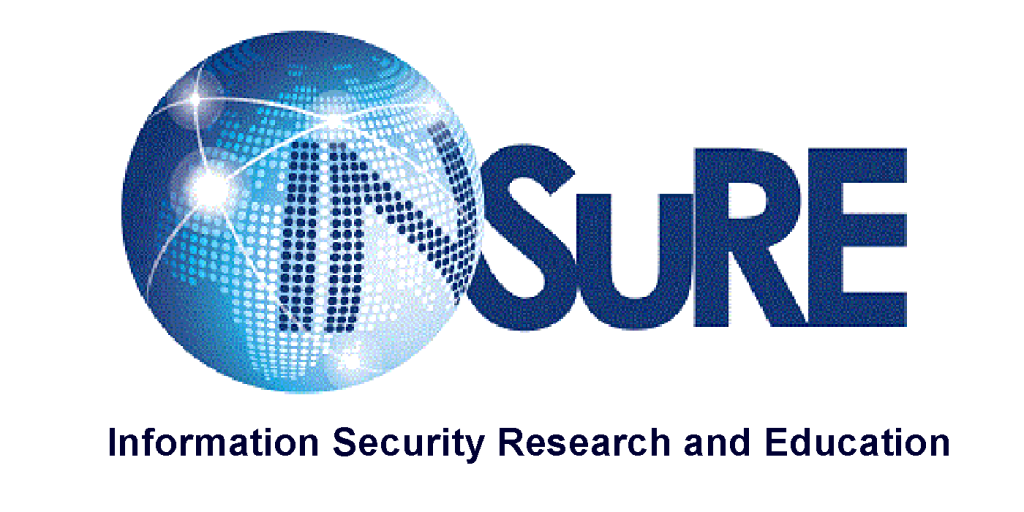
UMBC’s Cyber Defense Lab presents
Presentations of the UMBC INSuRE Research Projects from Fall 2020
12:00noon–1:30pm, Friday, 18 December 2020
via WebEx
The Information Security Research and Education (INSuRE) research collaborative is a network of National Centers of Academic Excellence in Cyber Defense Research (CAE-Rs) universities that cooperate to engage students in solving applied cybersecurity research problems. Since fall 2012, INSuRE has fielded a multi-institutional cybersecurity research course in which BS, MS, and Ph.D. students work in small groups to solve unclassified problems proposed by the National Security Agency (NSA) and by other government and private organizations and laboratories.
Schedule
12:00-12:15pm poster presentations
12:15-12:40pm Detecting Web-Based Cryptomining Malware by Mining Open-Source Repositories
12:40-1:05pm Meeting Mayhem: A Network Adversary Game
1:05-1:30pm Analysis of the 5G AKA protocol with Comparison to 4G AKA
Detecting Web-Based Cryptomining Malware by Mining Open-Source Repositories
Naomi Albert, Elias Enamorado, Benjamin Padgette, Anshika Patel
Technical Director: William J. La Cholter (APL)
UMBC Expert: Charles Nicholas
With the ever-increasing popularity of browser-based cryptomining it is now more important than ever to detect malicious cryptojacking code. This paper serves to identify reliable indicators of injected cryptomining code in open-source repositories using static source code analysis techniques. We analyze static source code features of a curated set of cryptomining projects and innocuous codebases that are available as open-source projects on GitHub. Through this analysis we show that a novel Normalized Halstead Difficulty metric can be an important indicator of the presence of cryptomining software. Specifically, the Normalized Halstead complexity is significantly higher for cryptomining source code files as compared to the sampled non-miners. Using this newfound knowledge of the complexity of browser-based JavaScript cryptominers, supply-chain cryptojacking injection attacks in open-source repositories may be easier to identify through automated code review techniques.
Meeting Mayhem: A Network Adversary Game
Richard Baldwin, Trenton Foster
Technical Director: Edward Zieglar (NSA)
UMBC Experts: Marc Olano, Linda Oliva
Meeting Mayhem, a web-based educational game, teaches adversarial thinking through the Dolev-Yao security model. Meeting Mayhem is based on the paper-and-pencil “Protocol Analysis Game,” introduced by Edward Zieglar and adapted by UMBC PhD student Enis Golaszewski. Two or more users try to arrange a meeting time and place by sending messages through an insecure network controlled by an adversary. Through self discovery, players learn the dangers of network communications and the value of sound protocols supported by encryption, hashing, and digital signatures.
Formal Methods Analysis of the 5G AKA protocol, with Comparison to 4G AKA
Prajna Bhandary, Ryan Jahnige, Jason Schneck
Technical Director: Edward Zieglar (NSA)
We analyze the Fifth Generation (5G) Authentication and Key Agreement (AKA) protocol and the Fourth Generation (4G) Evolved Packet System Authentication and Key Agreement (EPS-AKA) protocol for possible structural faults using the Cryptographic Protocol Shapes Analyzer (CPSA). It is fundamental to provide authentication and key management in the security of cellular networks. 5G AKA provides mutual authentication between subscribers and the network, by providing the keys to protect both signaling and user plane data. 4G defines an authentication method, EPS-AKA, whereas 5G offers several different authentication techniques: 5G AKA, 5G EAP-AKA, and 5G EAP-TLS. In addition to our formal method analysis of 5G AKA and 4G EPS-AKA, we also analyze the differences in security properties between the 4G EPS-AKA protocol, and 5G AKA protocol. We verify that the upgrades made to 4G EPS-AKA improves control of the Home Network (HN) in 5G AKA. Additionally, we found that the ambiguous nature of the documentation regarding the channel between Serving Network (SN) and HN results in authentication concerns and we propose a solution.
Course Instructor: Alan T. Sherman
Support for this event is provided in part by the NSF under SFS grant DGE-1753681. The UMBC Cyber Defense Lab meets biweekly Fridays 12-1pm. All meetings are open to the public. Upcoming CDL meetings:
Biweekly CDL talks will resume in the spring 2021 semester.
The 2021 UMBC SFS/CySP Research Study will take place remotely in January (likely January 11-15).
The post event: UMBC INSuRE Research Projects from Fall 2020, 12-1:30 ET 12/18 appeared first on Department of Computer Science and Electrical Engineering.